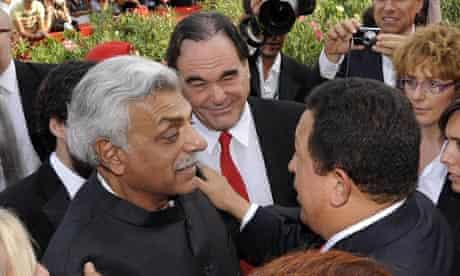by TARIQ ALI
 Writer/filmmaker Tariq Ali (left), filmmaker Oliver Stone (in red necktie) and late Hugo Chavez, Venezuelan leader. PHOTO/The Guardian
Writer/filmmaker Tariq Ali (left), filmmaker Oliver Stone (in red necktie) and late Hugo Chavez, Venezuelan leader. PHOTO/The Guardian
The Introduction to “The Dilemmas of Lenin: Terrorism, War, Empire, Love, Revolution” by TARIQ ALI (Verso, 2017)
Why Lenin? First, because this is the centenary year of Europe’s last great revolution. Unlike its predecessors, the 1917 October Revolution transformed world politics and, in the process, remade the twentieth century with a frontal assault on capitalism and its empires, accelerating decolonialisation. Secondly, today’s dominant ideology and the power structures it defends are so hostile to the social and liberation struggles of the last century that a recovery of as much historical and political memory as is feasible becomes an act of resistance. In these bad times, even the anti-capitalism on offer is limited. It is apolitical and ahistorical. The aim of contemporary struggle should be not to repeat or mimic the past but to absorb the lessons, both negative and positive, that it offers.
It is impossible to achieve this while ignoring the subject of this study. For a long time during the last century, those who honoured Lenin largely ignored him. They sanctified him, but rarely read his work. More often than not, and on every continent, Lenin was misinterpreted and misused for instrumentalist purposes by his own side: parties and sects large and tiny who claimed his mantle.
The Lenin cult, which he loathed even in its most incipient form, was a disaster for his thought. His texts, never intended or written as a catechism, were mummified, making it difficult to understand his political formation. This phenomenon must be situated at the confluence of two historical processes. Lenin was a product of Russian history and the European labour movement. Both posed questions of class and party, of agency and instrument. The synthesis developed by Lenin was thus determined by the intermingling of two very different currents that can be characterised, broadly speaking, as anarchism and Marxism. He played a crucial role in the triumph of the latter.
That is why, before moving on to discuss some specific problems confronted by Lenin and the Bolsheviks, I will explain at length the history and prehistory of both currents. Without this excavation, it’s not easy to understand the dilemmas that confronted Lenin.
It takes imagination to misread Lenin and Trotsky or present them as liberals underneath the mask. Whatever one might think of them, the lucidity of their prose leaves little room for political misinterpretation. As Perry Anderson has recently reminded us, the fate of Gramsci, the third major thinker produced by the Communist tradition of the Third International, has been somewhat different and for specific reasons relating to his imprisonment by the Italian fascists.1
Frontline for more
